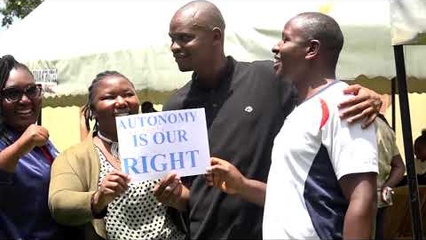Jaime Escalante’s story is one of faith, grit, and unshakable belief in the potential of students who had been written off. A Bolivian-born Mathematics teacher in a poor East Los Angeles school, Escalante walked into classrooms full of students from tough backgrounds – many of whom were involved in gangs, struggled academically or had no family support. These learners were labelled as lazy, disruptive and unteachable. But Escalante refused to accept those labels. He chose instead to see brilliance hidden beneath layers of neglect, low expectations and broken systems. Through rigorous teaching, unorthodox methods and high standards, he turned struggling learners into some of the top performers in the country.
In 1982, eighteen of his students sat for the Advanced Placement Calculus exam and passed. This achievement shocked the education establishment because no one expected such results from a public school in a poor neighbourhood. The success was so astonishing that authorities accused the students of cheating. Escalante stood firmly with his learners, knowing they had worked hard and earned their success. The students retook the test under stricter supervision and passed again, silencing doubters and validating his belief that every learner, regardless of background, can excel if given the opportunity and the right support.
Bringing this powerful story home to Kenya, the lessons are many and deeply relevant. Kenyan schools, especially in rural and informal settlements, face a reality similar to that of Garfield High School. Teachers encounter overcrowded classrooms, under-resourced schools, and students who struggle with poverty, trauma, absentee parents, and low self-esteem. Just like Escalante’s students, many Kenyan learners carry the burden of being labeled failures before they even step into a classroom. They are told they are slow, weak, undisciplined, or not meant for academics. These labels, once internalized, crush self-belief and diminish motivation. But Escalante’s example offers a different path – a path of hope and transformation.
Kenyan teachers must learn to challenge the culture of low expectations that has become too common in many schools. When teachers treat struggling learners as incapable or as academic dead weight, they reinforce cycles of failure. Escalante didn’t lower the bar to accommodate his learners—he raised it and then walked with them until they could reach it. He extended his time beyond regular school hours, offered remedial classes, simplified complex ideas without watering down content, and instilled a deep belief that excellence was possible. He respected his students enough to push them.
What this teaches Kenyan educators is that teaching is not just about covering the syllabus. It is about uncovering potential. Escalante worked with some of the most ‘unlikely’ candidates for academic success, and yet, through resilience and relentless mentorship, they rose. Similarly, a child in Turkana, Kibera, or Gatundu North is not beyond reach. What that learner needs is a teacher who will believe in them, insist on their worth, and walk the extra mile to unlock their brilliance. Education is not a one-size-fits-all affair. Teachers must learn to differentiate instruction, listen to learners’ individual struggles, and find culturally responsive ways to make learning meaningful.
Moreover, Escalante’s story highlights the importance of teaching with courage. In Kenya, too many teachers are content to do the bare minimum, citing lack of motivation, poor pay, or government neglect. While these are genuine challenges, Escalante faced similar hurdles. He taught in a broken system, with limited resources, and among students who many thought could never succeed. But he did not allow his circumstances to limit his impact. Instead of complaining, he created change from within. Kenyan teachers need to rediscover their sense of calling. Teaching is not just a job—it is a mission to shape minds and save futures. Great teachers are not remembered for how well they finished the syllabus, but for how deeply they touched lives.
READ ALSO:
Little-known West Pokot School stuns region, wins North Rift Girls’ football championship
Escalante also teaches the importance of high expectations. In many Kenyan schools, especially in public setups, teachers have unconsciously lowered standards for students they believe come from poor families or weak academic backgrounds. This attitude must change. When you expect more from learners and communicate those expectations clearly and consistently, they often rise to the occasion. Children sense when someone believes in them. That belief can become the turning point of their lives. A struggling student might not need extra tuition as much as they need a teacher to say, “I believe you can.”
Another takeaway for Kenyan educators is the need for innovation and adaptability. Escalante did not rely solely on traditional methods. He found creative ways to make calculus engaging. Kenyan teachers must be ready to adapt their methods to fit the needs of their learners. Teaching should not be a rigid routine but a dynamic interaction. Use local examples, integrate stories, embrace digital tools where possible, and foster a love for learning rather than fear for exams.
Lastly, Escalante’s solidarity with his students when they were accused of cheating is a lesson in loyalty and moral leadership. He trusted them. He stood up for them. He became their defender when the world doubted them. This is the kind of mentorship Kenyan learners need – teachers who not only teach but also protect, advocate for, and stand with them. Too many students face ridicule, humiliation, and indifference when they struggle. What they need is encouragement, affirmation, and protection.
In the end, Escalante’s message is simple but powerful: every child can succeed. Not some. Not the best-behaved or most privileged. Every child. This is the philosophy that must anchor the Kenyan classroom. We must move from a system of selection to one of transformation. Teachers must see themselves not as gatekeepers of knowledge but as guides and gardeners – nurturing, pruning, and patiently cultivating potential. It is time we stopped asking, “How bright is this student?” and started asking, “How can I bring out their light?” That is the legacy of Jaime Escalante. And that is the challenge Kenyan teachers must embrace.
Ashford Kimani
Ashford teaches English and Literature in Gatundu North Sub County and serves as Dean of Studies.
You can also follow our social media pages on Twitter: Education News KE and Facebook: Education News Newspaper for timely updates.
>>> Click here to stay up-to-date with trending regional stories
>>> Click here to read more informed opinions on the country’s education landscape






